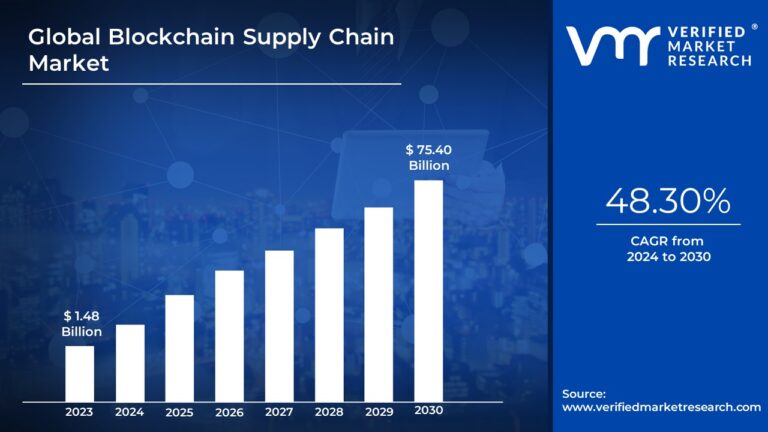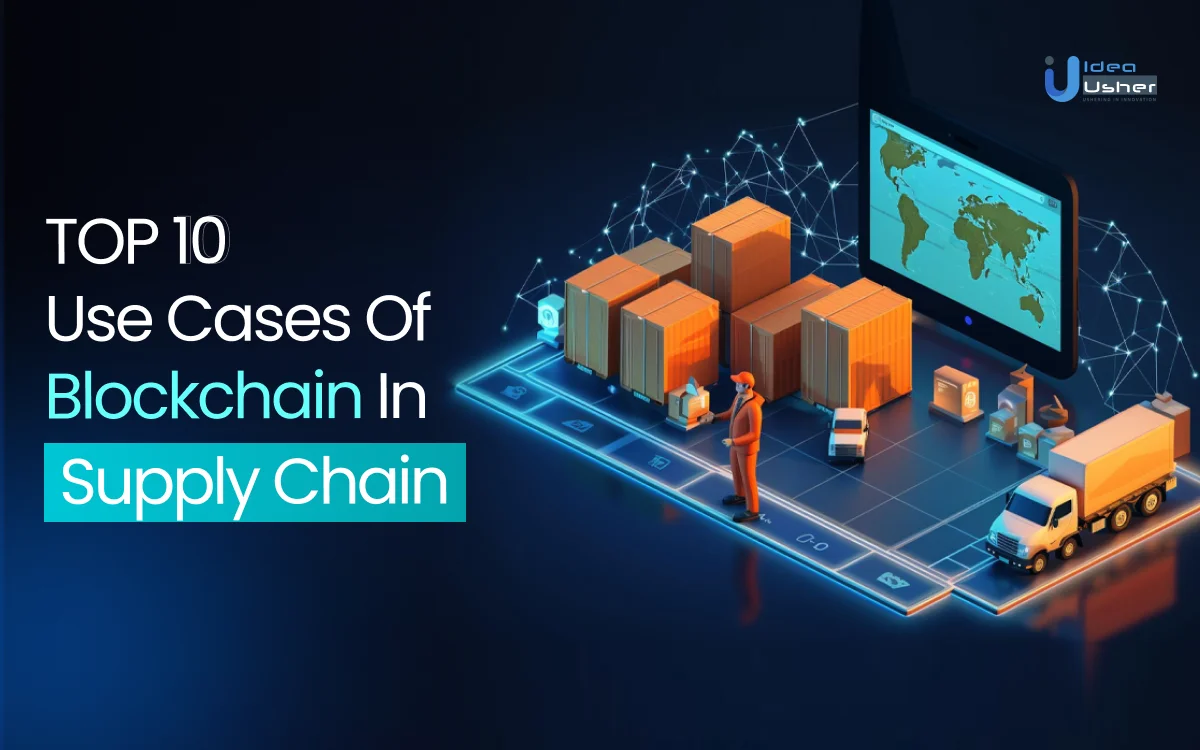Supply chain industries are facing inefficiencies and transparency issues with traditional methods. Blockchain technology provides a secure and transparent distributed ledger system that can help overcome these struggles. This technology uses a network of computers to safely store and share information in tamper-proof blocks, leading to increased trust and visibility within the network.
Blockchain technology can result in faster transactions and better decision-making based on real-time data, making it an attractive option for businesses across the supply chain and logistics industry. Industry leaders like Walmart and Maersk are already taking advantage of blockchain technology in their supply chain solutions. The following sections will explore the top ten use cases for blockchain in the supply chain sector, providing real-world examples and equipping you with the knowledge to unlock the potential of blockchain within your own supply chain network.
How Does Blockchain Revolutionize Supply Chains?
Blockchain technology transforms supply chains by tackling challenges such as transparency, traceability, and efficiency. Acting as a decentralized ledger, blockchain eliminates the need for a central authority, thus enhancing trust and transparency in transactions.
With blockchain, transactions (including product movements and payments) are recorded chronologically and immutably to ensure data integrity. Moreover, consensus mechanisms, like proof of work or proof of stake, ensure agreement on transaction validity to reduce the risk of tampering. Altogether, these features significantly contribute to supply chains:
- Enhanced Traceability: Blockchain enables tracking products from origin to final destination, providing real time visibility and improving quality control.
- Streamlined Processes: Automation through smart contracts reduces manual work and errors, thus optimizing operations.
- Increased Transparency: Secure data sharing among all participants fosters trust and transparency within the supply chain ecosystem.
- Improved Efficiency: Optimal inventory management and minimized disruptions lead to enhanced operational efficiency.
Blockchain revolutionizes supply chains by promoting collaboration, efficiency, and trust among all stakeholders, paving the way for a more resilient and interconnected supply chain ecosystem.
Market Trends For Blockchain In Supply Chain Management

The blockchain supply chain market is projected to experience significant growth, with an estimated CAGR of 48.25% from 2023 to 2032.
In another study, the market size for Blockchain Supply Chain is predicted to be USD 0.84 billion in 2024, escalating to USD 6.31 billion by 2029, with a CAGR of 49.87% during the forecast period (2024-2029).
Furthermore, according to data from Verified Market Research, the Blockchain Supply Chain Market was valued at USD 1.48 Billion in 2023 and is anticipated to reach USD 75.40 Billion By 2030, growing at a CAGR of 48.30% during the forecast period 2024 to 2030.
These statistics highlight the potential growth of the market. The primary factors promoting this growth are the rising demand for transparency in supply chains and enhanced security of supply chain transactions. Additionally, the introduction of automation and the removal of intermediaries through blockchain technology in supply chain management could present opportunities for market expansion.
Top 10 Real-World Use Cases Of Blockchain Supply Chain Solutions
Here are the top 10 real-world use cases of blockchain in supply chain solutions with examples:
1. Transparency
Traditionally, supply chain data resides in isolated databases owned by individual companies. This blocks information flow and reduces transparency. Blockchain breaks down these issues by establishing a shared and secure ledger accessible to authorized participants. Every transaction is documented on the blockchain ledger. Since the ledger is tamper-proof, any attempt to alter the data would be immediately flagged. This promotes trust among all participants.
Transparency through blockchain enables suppliers to demonstrate ethical sourcing practices by sharing details about origin and labor conditions. Even manufacturers can verify the quality of components by seeing their movement through certified facilities. Ultimately, every consumer gains confidence in the products they purchase.
Brands Using Blockchain In Supply Chains For Transparency
- Walmart: Walmart has been at the forefront of blockchain adoption for food traceability. They partnered with IBM to develop a blockchain platform that tracks the origin of leafy greens like lettuce and mangoes. This allows them to trace products back to the farm level, ensuring ethical sourcing, identifying potential contamination sources faster in case of recalls, and improving overall food safety.
- Everledger: This company focuses on applying blockchain to track diamonds throughout the supply chain, recording their origin, ownership changes, and certifications. This helps prevent conflicts associated with diamond mining and ensures consumers are getting ethical diamonds.
2. Smart Contracts
Smart contracts are essentially self-executing agreements written in code and stored on the blockchain. These contracts define specific conditions that need to be met before an action is triggered. For example, a smart contract for a shipment release from customs might require confirmation of payment and temperature checks being within a specific range. Once these conditions are met on the blockchain, the contract automatically executes, releasing the shipment without human intervention. This reduces paperwork, delays, and the potential for errors caused by manual processing.
Brands Using Blockchain In Supply Chains For Smart Contracts
- Maersk: They have utilized blockchain’s automation capabilities through smart contracts and implemented a blockchain platform that automates customs clearance processes. When predefined conditions like payment confirmation and necessary documentation are met on the blockchain, the smart contract automatically triggers the release of goods from customs, streamlining the process and reducing delays.
- TradeLens: This is a collaborative effort between Maersk and IBM specifically focused on using blockchain for smart contracts in global trade. TradeLens allows for the secure and transparent exchange of trade documents between all stakeholders involved, from exporters and importers to customs officials and logistics providers. Smart contracts automate key steps in the process, such as triggering payments upon cargo delivery confirmation.
3. Inventory Management
Traditionally, inventory management relied on estimates and periodic checks, which is the drawback. Therefore, blockchain implementation for inventory management enables real time data on stock levels across the entire supply chain. Every time a product moves (e.g., from warehouse to store), the ledger is updated. This allows businesses to have a precise picture of their inventory at any given moment. With this data, they can optimize stock levels, preventing stockouts and overstocking. Additionally, they can identify trends in demand and adjust production or ordering plans accordingly.
Brands Using Blockchain In Supply Chains For Inventory Management
- Unilever: They are piloting a blockchain-based system to track tea leaves from farm to factory. This allows them to monitor inventory levels in real time across the supply chain. By having accurate data on tea leaf stockpiles, Unilever can optimize ordering and production schedules, reducing the risk of stockouts or overstocking.
- Siemens: They utilize blockchain to manage inventory levels across their complex network. By tracking components through the supply chain on a blockchain ledger, Siemens can have real time visibility into stock levels at various locations. This allows for better planning and coordination between manufacturing facilities, ensuring they have the necessary parts on hand to avoid production delays.
4. Compliance
Regulations concerning safety standards, labor laws, and environmental impact can be complex and burdensome to comply with. Blockchain simplifies this process by providing an auditable and secure record of transactions. Every action taken throughout the supply chain is documented on the tamper-proof ledger. Businesses can easily demonstrate adherence to regulations by providing auditors with access to this secure record. This reduces the risk of reputational damage and fines associated with non-compliance.
Brands Using Blockchain In Supply Chains For Compliance
- British Standards Institution (BSI): This organization offers blockchain-powered solutions for compliance management. BSI’s platform helps companies across various industries, like food and pharmaceuticals, ensure they adhere to regulations.
- De Beers: A leading diamond producer, De Beers, utilizes blockchain to track diamonds and ensure they comply with the KPCS (Kimberley Process Certification Scheme) regulations that prevent the trade of conflict. De Beers uses blockchain to record the origin and movement of diamonds, ensuring they comply with KPCS requirements.
5. Traceability
In a blockchain-powered supply chain, each product or component receives a unique digital identity. As the product moves through various stages, from raw materials to finished goods, participants can record relevant data points onto the blockchain ledger. This data can include location, time stamps, and even sensor readings (e.g., temperature for perishable goods). The key here is the distributed nature of the ledger. All authorized participants (manufacturers, distributors, retailers) have access to the same record, ensuring everyone sees the same information. This allows for real time tracking and pinpointing the exact location of a product at any given time.
Brands Using Blockchain In Supply Chains For Traceability
- IBM Food Trust: This platform developed by IBM focuses on food safety and traceability. It uses blockchain to track foodborne illnesses and ensure the safety of food products from farm to fork. When a food safety issue arises, the platform allows authorities to quickly identify the source of contamination and trace potentially affected products, minimizing the risk of outbreaks.
- Everledger (beyond diamonds): While diamonds are a core focus, Everledger also offers solutions for tracking the provenance of luxury goods beyond just gems. They utilize blockchain to track the origin and ownership history of high-value items like luxury handbags and artwork. This allows consumers to verify the authenticity of these items and helps combat counterfeiting in the luxury goods market.
6. Product Authentication
Counterfeiting is a major concern across various industries, from luxury goods to pharmaceuticals. Blockchain offers a secure method to verify product authenticity. Each product receives a unique digital identifier linked to a blockchain record. This record tracks the product’s journey throughout the supply chain, from manufacturing to final sale.
Consumers can then use a smartphone app to scan a product’s QR code or other identifier. This code retrieves the corresponding blockchain record, allowing them to verify the product’s authenticity and origin. This empowers consumers to make better purchasing decisions and helps brands protect their reputation from counterfeiters.
Brands Using Blockchain In Supply Chains For Product Authentication
- VeChain: They work with companies in sectors like luxury goods, pharmaceuticals, and food & beverage to implement blockchain-based authentication systems. These systems use unique digital IDs and tamper-proof records on the blockchain to verify the authenticity of products, allowing consumers to be confident they are purchasing genuine items.
7. Quality Control
Maintaining product quality is essential in any supply chain. Traditionally, quality checks happen at specific points in the process, but blockchain (combined with sensor technology) allows for more continuous quality monitoring. Sensors embedded in products or packaging can collect real time data on critical factors like temperature, humidity, and pressure.
This sensor data is then uploaded to the blockchain ledger, creating a tamper-proof record of the product’s condition. By analyzing this data, businesses can identify potential quality issues early on before they become bigger problems. This allows for targeted interventions and reduces the risk of product recalls.
Brands Using Blockchain In Supply Chains For Quality Control
- Te-Food: They focus on temperature-controlled logistics for food transportation. Te-Food uses blockchain to track temperature and other environmental factors (e.g., humidity) during food transportation. Sensors embedded in packaging or placed strategically within shipping containers collect real time data. That data can be used to identify potential quality issues early on, such as temperature fluctuations that could spoil food. This allows for swift corrective actions, minimizing product spoilage and waste.
- Nestlé: They are piloting a blockchain-based system to track the quality of coffee beans throughout the supply chain. Similar to Te-Food, they can utilize sensors to monitor factors like temperature and humidity during transportation. Additionally, they can track information like the origin of the coffee beans and any processing steps they undergo to ensure the quality of their coffee.
8. Financing
Access to financing can be a challenge for some participants in a traditional supply chain. However, the secure and transparent nature of blockchain can improve access to financing. Financial institutions gain greater confidence in transactions recorded on the blockchain. This can lead to easier access to loans and trade finance options for businesses throughout the supply chain.
Brand Using Blockchain In Supply Chains For Financing
- Trade Finance Global: This company uses blockchain to streamline trade finance processes and improve access to financing for businesses involved in international trade. Blockchain simplifies their process by providing a secure and transparent platform for exchanging trade documents and facilitating payments.
Beyond established players like Trade Finance Global, there’s a growing number of startups focusing on developing innovative blockchain-based solutions for supply chain finance. These solutions can offer features like automated financing based on predefined conditions within smart contracts and improved visibility into trade transactions for all involved parties.
9. Risk Management
Fraud, counterfeiting, and disruptions can pose significant risks to supply chains. Blockchain helps eliminate these risks by providing a tamper-proof record of transactions. Any attempt to alter the data would be immediately flagged, allowing for swift identification of suspicious activity.
Brand Using Blockchain In Supply Chains For Risk Management
- Everledger and Counterfeit Mitigation: As mentioned earlier, companies like Everledger are using blockchain for traceability and can help mitigate the risk of counterfeit goods entering the supply chain.
10. Sustainability
Consumers are increasingly concerned about the environmental impact of the products they purchase. Blockchain can promote sustainable practices by tracking the environmental footprint of products throughout their lifecycle. This includes factors like energy consumption during manufacturing, transportation emissions, and waste generation.
By analyzing this data, businesses can identify areas for improvement, such as using recycled materials or reducing energy consumption in production. This allows them to demonstrate their commitment to sustainability and attract environmentally conscious consumers.
Brands Using Blockchain In Supply Chains For Sustainability
- IBM Food Trust and Environmental Impact: Beyond food safety, IBM Food Trust can also contribute to tracking the environmental impact of food production. The platform can record data on factors like water usage, fertilizer application, and transportation emissions associated with food products. This will allow them to meet the growing consumer demand for environmentally responsible products.
- BASF and Supply Chain Sustainability: BASF is exploring the use of blockchain to track the sustainability of their products throughout the supply chain. This could involve tracking factors like the source of raw materials and the energy consumption during production. By having this data readily available, BASF can demonstrate its commitment to sustainability to its customers and stakeholders.
Is Blockchain Right For Your Business?
While blockchain boasts exciting potential, it’s not a one-size-fits-all solution. Here’s how to assess if it aligns with your needs:
- Industry Compatibility: Analyze how blockchain benefits your specific industry. For example, in complex food supply chains, it can enhance traceability.
- Supply Chain Complexity: Evaluate your supply chain’s complexity. Highly intricate networks might benefit more from blockchain’s transparency and automation.
- Implementation Challenges: Consider the resources and expertise needed to implement blockchain. More complex supply chains may require a more nuanced approach.
- Cost-Benefit Analysis: While blockchain offers numerous advantages, remember to consider the cost of implementation and maintenance. You can conduct a cost-benefit analysis to ensure the return on investment justifies the initial investment.
- Scalability: Think about the future of your business. Choose a blockchain platform that can handle your current needs and has the potential to scale as your supply chain grows.
Conclusion
Blockchain technology provides a unique combination of transparency, traceability, and security that can effectively address long-standing challenges while creating new opportunities. Several trends suggest that blockchain will play an important role in forming the future of supply chains, including enhanced collaboration, integration with the Internet of Things (IoT) and AI, interoperability, and standardization. This technology can transform supply chains from fragmented ecosystems to interconnected, efficient, and transparent networks. By embracing these advancements, businesses can gain a competitive edge, improve customer satisfaction, and contribute to a more sustainable future. As we move forward, innovation, responsible implementation, and collaboration will be key to embracing the full potential of blockchain in transforming the global supply chain segment.
How Can We Help Developing A Blockchain Solution?
At Idea Usher, we specialize in creating customized blockchain solutions that can address the challenges faced by businesses in the supply chain ecosystem. Our experts utilize their skills and innovative approaches to offer comprehensive support to organizations seeking to optimize their operations and drive growth.
Our solutions are designed to unlock new levels of efficiency and trust by enhancing transparency and traceability, streamlining processes, and ensuring compliance. With a proven track record of successful projects, Idea Usher is your trusted partner in harnessing the transformative power of blockchain technology to propel your business forward in supply chain management. Contact us today to learn more about implementing blockchain in your business.
Work with Ex-MAANG developers to build next-gen apps schedule your consultation now
FAQ
What are blockchain solutions for supply chains?
These are digital ledger technologies that enhance visibility and traceability in supply chains. They help reduce administrative overheads, manage risks, and control emissions in industries that are resource-intensive.
What are blockchain solutions?
These are systems that leverage distributed digital ledgers, cryptography, and immutable record-keeping to document, authenticate, and view transactions across a network. They enable secure and automated transactions via smart contracts.
How does blockchain enable supply chain management?
Blockchain facilitates real-time tracking and monitoring of goods at every stage of the supply chain. It provides a transparent, tamper-proof record of information flows, inventory flows, and financial flows in transactions.
What is the blockchain solution for the food supply chain?
Blockchain technology in the food supply chain offers a transparent, unchangeable, and traceable ledger that minimizes discrepancies and information fraud. It ensures every step, from farm to table, is traceable, enhancing food safety and quality.





















